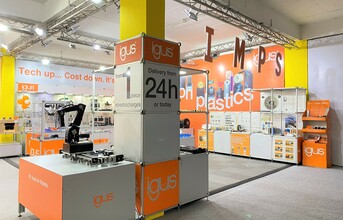
World over, plastic has always been in the eye of the storm for the hazard it poses to the environment. Much has been discussed and written about the harmful effects of plastic on the environment. In simple terms, plastic pollution accumulates plastic objects and particles in the earth's environment that adversely affects wildlife, wildlife habitat, humans, and the environment overall.
Debunking popular connotations that plastic is the biggest environmental hazard, a global leader in motion plastics, Igus GmbH entered the business of manufacturing motion (movable) parts in a machine using high-quality plastic, traditionally manufactured using various materials types of metal. When igus was founded in 1964, environmental hazard was unheard of. Even then, igus took it upon itself to make its products with the least environmental impact and recyclable. Since then, the company has focused on its sustainable corporate activities. Igus has undertaken various initiatives like plastic recycling, energy chains recycling, tree plantation, etc.
Talking about igus's recycling program, Deepak Paul, Managing Director, igus India, says, "Our polymers do not require lubrication and are optimised for wear. They do not rust and do not get dirty from grease and dirt, doing away with the need for replacement frequently. Together with the lower weight, this ensures that less drive energy must be used to move a machine part in an application. While on the one hand, we make our products, which are environment-friendly right at the production stage, igus has also put in place multiple recycling programs which demonstrate our commitment to environmental protection and leave a lesser carbon footprint on the environment. Through our sustainability initiatives, we are committed to being the leader in unique and innovative sustainability initiatives just like our products."
Some of the noteworthy recycling initiatives of igus involve infusing a fresh lease of life into discarded electrical appliances under which trainees transform old computers into functional devices for private use, for which igus was awarded the best MINT employer. Titled ‘reguse', the project involves a trainee business unit turning the electrical waste produced at igus back into functional electrical devices for personal use. The IT trainees deal with the technology, the industrial business trainees handle the legal issues, and a media designer trainee takes care of marketing. Everything from laptops and PCs to monitors is reconditioned and then offered for sale to igus employees in Cologne, Germany, at a reasonable price. Alternatively, the so-called refurbished devices and all proceeds are donated to sustainable and charitable projects.
Another crowning glory project that adds feathers to igus's cap is its ‘chainge' recycling program. The ‘chainge' recycling programme is a green initiative. Under this program, customers can send discarded energy chains, regardless of the manufacturer, to igus for recycling. Igus ensures that they will be recycled responsibly and not end up as landfills and other plastic waste. For this commitment, a value voucher is given for their next igus purchase in exchange.
Avoidance of CO2 emissions is another critical concern for igus, and to achieve this, igus is involved in reforestation initiatives worldwide. From planting 5000 trees in 2020 and 2021, igus witnessed a 3x increase in reforestation efforts, where igus planted 17,904 trees globally. In India, along with Sankalp Taru Foundation, igus has undertaken a tree-planting project to create more biodiversity, soil resilience and a stable water table in the Mahabalipuram region.
There are 3000 saplings planted on two hectares of land - a total of 14 different species, including healing, fruit-bearing and shade-giving plants. A similar initiative was carried out in Pune, and another 3000 trees were planted to increase the urban greenery and improve the city's air quality. Over the next 35 years, they will be able to produce approx 33,971 tonnes of oxygen, bind 12,356 tonnes of CO2 and filter 762,574,000 litres of water. Careful monitoring and maintenance of the plant locations ensure that over 95% of the seedlings survive.
Igus has also invested in ‘Hydrothermal plastic recycling solution' start-up, Mura Technology, which converts plastic back to oil through a 25-minutes chemical recycling method, using water, heat and pressure. The technology enables plastic, which would otherwise pollute the environment, to be reused as a valuable raw material. Through this investment, igus aims to contribute meaningfully to building a sustainable, circular economy and preventing plastic waste from degrading the environment.
As much as igus is committed to providing innovative and cost-effective solutions, it is also committed to making the world cleaner, greener, and safer by reducing its carbon footprint.


























